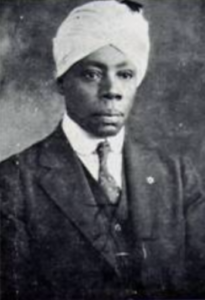
Arnold Josiah Ford
*Arnold Josiah Ford was born on this date in 1877. He was a Black poet, musician, composer, and the first Black Rabbi in America.
Ford was born in Barbados to Edward Thomas Ford and Elizabeth Augustine Ford. He asserted that his father’s ancestry could be traced to the Yoruba tribe of Nigeria and his mother's to the Mendi tribe of Sierra Leone. According to his family’s oral history, their heritage extended back to one of the priestly families of the ancient Israelites, and in Barbados, his family-maintained customs and traditions that identified them with Judaism (Kobre, 27). His father was a policeman and preacher’ at the Wesleyan Methodist Church where Arnold was baptized; yet, it is unknown if Edward’s teaching espoused traditional Methodist beliefs or urged the embrace of Judaism that his son would later advocate.
Ford’s parents intended for him to become a musician. They provided him with private tutors who instructed him in several instruments, particularly the harp, violin, and bass. As a young adult, he studied music theory with Edmestone Barnes and, in 1899, joined the musical corps of the British Royal Navy, where he served on the HMS Alert. According to some reports, Ford was stationed on the island of Bermuda, where he secured a position as a clerk at the Court of Federal Assize, and he claimed that before coming to America, he was a minister of public works in the Republic of Liberia, where many ex-slaves and early black nationalists settled. When Ford arrived in Harlem around 1910, he gravitated to its musical centers rather than to political or religious institutions, although within black culture, all three are often interrelated.
He was a member of the Clef Club Orchestra, under the direction of James Reese Europe, which first brought jazz to Carnegie Hall in 1912. Other black Jewish musicians, such as Willie “the Lion” Smith, an innovator of stride piano, also congregated at the Clef Club. Shortly after the orchestra’s Carnegie Hall engagement, Ford became the director of the New Amsterdam Musical Association. His interest in mysticism, esoteric knowledge, and secret societies is evidenced by his membership in the Scottish Rite Masons, where he served as Master of the Memmon Lodge. During this period of activity in Harlem, he married Olive Nurse, with whom he had two children before they divorced in 1924.
As a linguist, poet, musician, and composer, he produced many Universal Negro Improvement Association and African Communities League (UNIA-ACL) songs; Ford co-authored The Universal Ethiopian Anthem with Benjamin E. Burrell and was a prominent member of Harlem's Black Jews community. Ford officially functioned as director of the UNIA Band, Orchestra, Band of the African Legion, and the Liberty Hall Choir.
He published the Universal Ethiopian Hymnal in 1920. In 1930 he and a small group of Black Jews went to Ethiopia, where they participated in the coronation of Emperor Haile Selassie, created a school, and acquired 800 acres (320 ha) of land to unite Black Jews of the Diaspora with their brothers already in Ethiopia. He died there on September 16, 1935.